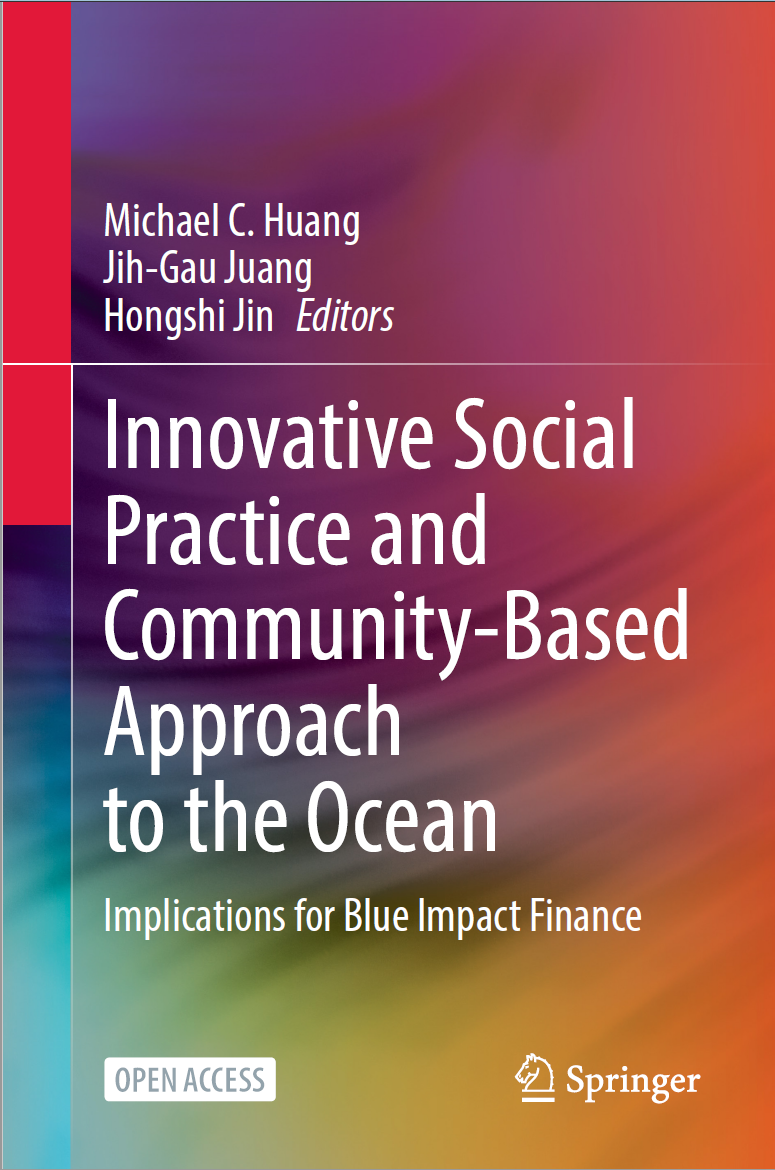Publications
Innovative Social Practice and Community-Based Approach to the Ocean

This book pioneers a community-based, people-centered approach to the ocean, bridging research, education, and social practice. Developed through collaboration between the Ocean Policy Research Institute of the Sasakawa Peace Foundation, the Taiwan–Japan Alliance of Local Revitalization and Social Practice (TJ Alliance). It presents methodologies, evaluations, and case studies of ocean-link initiatives rooted in social responsibility. Addressing challenges and opportunities in coastal regions and industries, the book explores innovative forms of blue impact and their assessment from social and environmental perspectives. It underscores how partnerships among universities, think tanks, and communities foster sustainability and positive societal change.
Bibliographic Information
Book Title: Innovative Social Practice and Community-Based Approach to the Ocean
Book Subtitle: Implications for Blue Impact Finance
Editors: Michael C. Huang, Jih-Gau Juang, Hongshi Jin
DOI: https://doi.org/10.1007/978-981-96-9104-3
Publisher: Springer Singapore
Book Subtitle: Implications for Blue Impact Finance
Editors: Michael C. Huang, Jih-Gau Juang, Hongshi Jin
DOI: https://doi.org/10.1007/978-981-96-9104-3
Publisher: Springer Singapore
Contents
*each chapters are available from its titles
“Revitalizing Oceans, Empowering Communities”
Foreword by Amb. Tsuneo Nishida
Former Permanent Representative
The Permanent Mission of Japan to the United Nations
1 Investigating the Assessment and Evaluation of Blue Impact from Community-Based Approach for Ocean Through Think Tank-University Social Responsibility
Michael C. Huang, Jih-Gau Juang, and Hongshi Jin
Part I Methodology of Problem-Solving Structure for Coastal Region
2 Using a Logic Model to Assess the Social Impact of USR: How Universities Contribute to Local Communities
Kenji Okamura and Shingo Akaike
3 Using Jobs Theory to Evaluate the Use of Mobile Off-Grid Architecture (MOA) as a Means of Regional Revitalization
Shota Tajima
Part II Challenges and Opportunities of Ocean-Link Industries
4 Challenges Facing Ocean Education in Japanese Schools
Sachiko Oguma
5 Regional Revitalization Through Development of Taiwan’s Yachting Industry: Challenges and Opportunities
Hsueh-wen Chow, Weilin Lee, and Jyh-Yeuan Lo
6 Creating New Industries by Blue Tech: Challenges of Marine Open Innovation in Japan
Masahiro Hashimoto
Part III Innovative Forms of Blue Impact
7 A People-Centered Approach: The Case of Community-Based Ecotourism in Palau
Li-Yun Hsu and Hideyuki Shiozawa
8 Dynamic Material Culture and Digital Preservation: A Case Study of the Talugan Bunun Cultural Relics Museum
Ching-Ying Tung
Part IV Evaluating Blue Impact from Social and Environmental Perspective
9 Application of the Sustainable Livelihoods Framework to Analyze the Effect of the USR Program: A Case Study of the Badouzi Fishing Village
Hui-Chiao Wang
10 University–Community Engagement in Advancing Sustainable Fishing Village Development: A Case Study of Excellent Fishing Neighbourhood Build-Up Project
Ching-Yu Yang, Wen-Hong Liu, Hsiao-Chien Lee, and Chih-Cheng Lin
11 Sustainable Financing for Marine Protected Areas (MPAs): A Case Study of the Shiretoko Natural World Heritage Site
Miko Maekawa, Junko Toyoshima, and Mitsutaku Makino
12 Digital Narratives of the Matsu Islands: A Case Study of Theme-Based Travel Planning by University Students in Taiwan
Cheng-Yi Eric Lin and Sheng-Wen Tseng
“Revitalizing Oceans, Empowering Communities”
Foreword by Amb. Tsuneo Nishida
Former Permanent Representative
The Permanent Mission of Japan to the United Nations
1 Investigating the Assessment and Evaluation of Blue Impact from Community-Based Approach for Ocean Through Think Tank-University Social Responsibility
Michael C. Huang, Jih-Gau Juang, and Hongshi Jin
Part I Methodology of Problem-Solving Structure for Coastal Region
2 Using a Logic Model to Assess the Social Impact of USR: How Universities Contribute to Local Communities
Kenji Okamura and Shingo Akaike
3 Using Jobs Theory to Evaluate the Use of Mobile Off-Grid Architecture (MOA) as a Means of Regional Revitalization
Shota Tajima
Part II Challenges and Opportunities of Ocean-Link Industries
4 Challenges Facing Ocean Education in Japanese Schools
Sachiko Oguma
5 Regional Revitalization Through Development of Taiwan’s Yachting Industry: Challenges and Opportunities
Hsueh-wen Chow, Weilin Lee, and Jyh-Yeuan Lo
6 Creating New Industries by Blue Tech: Challenges of Marine Open Innovation in Japan
Masahiro Hashimoto
Part III Innovative Forms of Blue Impact
7 A People-Centered Approach: The Case of Community-Based Ecotourism in Palau
Li-Yun Hsu and Hideyuki Shiozawa
8 Dynamic Material Culture and Digital Preservation: A Case Study of the Talugan Bunun Cultural Relics Museum
Ching-Ying Tung
Part IV Evaluating Blue Impact from Social and Environmental Perspective
9 Application of the Sustainable Livelihoods Framework to Analyze the Effect of the USR Program: A Case Study of the Badouzi Fishing Village
Hui-Chiao Wang
10 University–Community Engagement in Advancing Sustainable Fishing Village Development: A Case Study of Excellent Fishing Neighbourhood Build-Up Project
Ching-Yu Yang, Wen-Hong Liu, Hsiao-Chien Lee, and Chih-Cheng Lin
11 Sustainable Financing for Marine Protected Areas (MPAs): A Case Study of the Shiretoko Natural World Heritage Site
Miko Maekawa, Junko Toyoshima, and Mitsutaku Makino
12 Digital Narratives of the Matsu Islands: A Case Study of Theme-Based Travel Planning by University Students in Taiwan
Cheng-Yi Eric Lin and Sheng-Wen Tseng